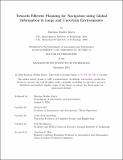Towards Efficient Planning for Navigation using Global Information in Large and Uncertain Environments
Author(s)
Kurtz, Martina Stadler
DownloadThesis PDF (31.94Mb)
Advisor
Roy, Nicholas
Terms of use
Metadata
Show full item recordAbstract
We would like to enable a team of robots to navigate quickly and efficiently in large and uncertain outdoor environments. We hypothesize that in such environments, global, uncertainty-aware information is necessary to enable high-quality planning. However, most existing systems do not model or plan using global, uncertainty-aware information. For example, many planners assume access to complete global information in the form of full environment maps, or they assume that locally good planning decisions under uncertainty will result in globally good planning outcomes. To enable the use of global information for planning in large and uncertain environments, we must develop models that concisely represent key navigation features of the environment, and build planners that are capable of reasoning efficiently about global information. In this thesis, we design models and planners that use global information in large and uncertain environments to increase the efficiency and quality of planning for navigation. We present four contributions towards using global information for efficient navigation. First, we propose a high-level planning representation that can be learned from previous plans considered in the environment and used online during hierarchical, multi-query robot navigation. Second, we propose a planner for collaborative multiagent navigation in an uncertain environment; the approach uses macro-actions and value function approximations to maintain computational tractability. Third, we develop a robust hierarchical planning system to enable the deployment of the collaborative multiagent planner on a real-world team navigating in a structured, uncertain outdoor environment. Finally, we develop a method for learning uncertainty-aware, single agent value function-based approximations from graph data to increase the efficiency of the collaborative multiagent planner.
Date issued
2024-09Department
Massachusetts Institute of Technology. Department of Aeronautics and AstronauticsPublisher
Massachusetts Institute of Technology